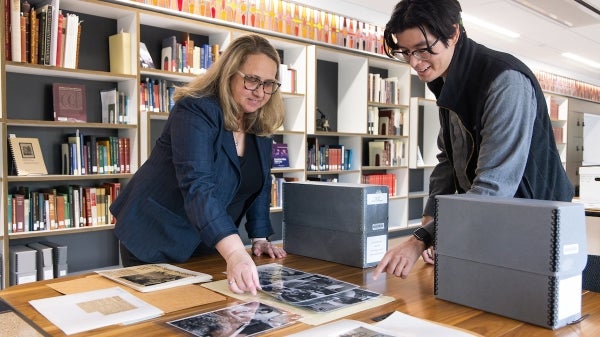ASU grad found a caring honors community and opportunity at ASU

Hannah Moton is graduating ASU in May with a bachelor's degree in health sciences, with honors from Barrett Honors College. Photo courtesy of Hannah Moton.
Editor’s note: This story is part of a series of profiles of notable spring 2024 graduates.
Hannah Moton’s proudest moment as an Arizona State University undergraduate student came when she saw her byline on an article in Health Affairs, a leading peer-reviewed journal of health policy thought and research.
Moton, who is graduating Arizona State University in May with a bachelor’s degree in health sciences from the College of Health Solutions, with honors from Barrett, The Honors College, was a co-author on an article titled “Addressing Perinatal Mental Health With A Diverse Workforce: A National Call To Action,” published in the journal on Nov. 2, 2023.
The article focuses on federal and state policies addressing perinatal mental health, critical care gaps for perinatal mental health conditions and the lack of diversity in the national mental health workforce.
“I consider being a co-author on for the College of Health Solutions maternal and child health translational research team’s policy brief on perinatal mental health and getting it published a great accomplishment,” said Moton, whose hails from Phoenix.
Moton’s interest in health care extended to her honors thesis titled “Finding a Treatment: Creating and Analyzing Treatment Care Options to treat Alcoholism.”
Moton, received the Obama Scholarship, Babcock Scholarship, Congressman Ed and Verma Pastor Scholarship and the Invest in the Best Scholarship. She served as a Barrett Honors College Peer Mentor and recruiting assistant. She was accepted into the Teach for America Fall 2024 Cohort to teach secondary science in Phoenix.
Here, Moton reflected on her undergraduate experience.
Question: What was your “aha” moment when you realized you wanted to study the field you majored in?
Answer: My aha moment when I realized that I wanted to study health sciences was when I realized there was gap in care pertaining to African American women and gynecological care.
Q: What’s something you learned while at ASU — in the classroom or otherwise — that surprised you or changed your perspective?
A: Something that I learned while at ASU that changed my perspective was that timing is everything and that everyone’s timing is different from my own.
Q: Why did you choose ASU?
A: I chose ASU because I knew that it had the necessary resources for me to grow while remaining within a reasonable distance from my family. ASU also provided me with the flexibility to study my interests without defining a major until my sophomore year.
Q: Why did you choose Barrett Honors College?
A: I chose Barrett, The Honors College because of the close-knit and supportive honors community. When I began the program my first year of college, I felt as though I did not belong and doubted my abilities in comparison to my peers. But with further participation in the Barrett program, I found a family and a foundation for my education here at ASU.
Q: Which professor taught you the most important lesson while at ASU and what was that lesson?
A: The professor that taught me the most important lesson while at ASU is Janelle Kappes, associate teaching professor in Barrett Honors College. Her unwavering support, along with that of my thesis committee, taught me the lesson of being able to surpass my limits and having faith in myself to continue and persevere.
Q: What’s the best piece of advice you’d give to those still in school?
A: The best piece of advice I would give to those still in school is to persevere because adversity comes, but at the end of it you will come out on top.
Q: What was your favorite spot on campus, whether for studying, meeting friends or just thinking about life?
A: My favorite spot, where I always met my best friend Heaven, is Boba Cutea near the ASU Downtown Phoenix campus. While studying there, we enjoyed the shop’s pretty decorations and great boba tea.
Q: If someone gave you $40 million to solve one problem on our planet, what would you tackle?
A: If given $40 million dollars to solve one problem on our planet, I would focus on houselessness in the United States and ways to to provide housing for people who are without it. In addition, I would provide addiction assistance programs and other resources to ensure and improve reintegration.
More Sun Devil community

University Archives chronicles more than 140 years of Sun Devil history
Editor’s note: This is part of a monthly series spotlighting ASU Library’s special collections throughout 2024.What was the name of the butcher who bequeathed the first piece of land that…

3 outstanding ASU alumni named The College Leaders of 2024
Three outstanding Arizona State University alumni from The College of Liberal Arts and Sciences will be named as this year’s slate of The College Leaders. The honor recognizes alumni for their…

From mushy ice to Mullett Arena
Greg Powers rubbed the top of his head and smiled.Powers, Arizona State University’s hockey coach, had been asked to reflect on the 10th anniversary of ASU hockey becoming an NCAA Division I program…